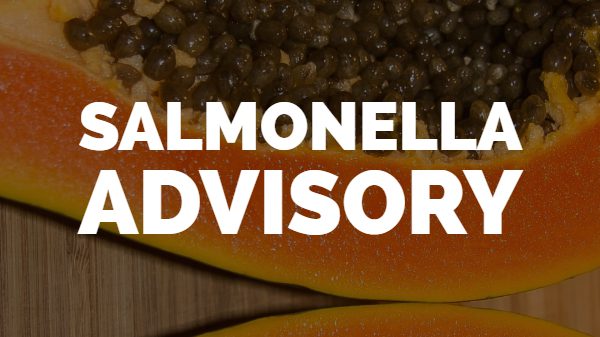The Centers of Disease Control and Prevention issued an advisory to consumers not to eat whole, fresh papayas imported from Mexico because of salmonella contamination.
The June 28 advisory targets consumers in Connecticut, Massachusetts, New Jersey, New York, Pennsylvania, and Rhode Island.
While CDC and the Food and Drug Administration investigate the outbreak of Salmonella Uganda, “the FDA strongly advises importers, suppliers, and distributors, as well as restaurants, retailers and other food service providers from all states to hold whole, fresh papayas imported from Mexico,” it said.
Bob Whitaker, chief science and technology officer for the Produce Marketing Association, sent the following message to members:
“On June 28, 2019, PMA participated in a call with the CDC and FDA where it was announced they are actively investigating another multistate outbreak of Salmonella related to whole, fresh papaya. At this time the current information implicates papaya imported from Mexico and involves Salmonella Uganda, an uncommon serotype within the U.S. CDC is reporting a current epidemiologically connected illness count of 62 reported clinical cases, with at least 23 reported hospitalizations and no deaths. These cases encompass 6 focus states (CT, MA, NY, RI, NJ, and PA). Additional cases involve residents of FL and TX, but the point of consumption exposure was determined to most likely be one of the focal states. The illness onset dates range from January 14, 2019 – June 8, 2019 with a majority of cases being reported in mid-April. Of the 62 reported cases, 10 were reported to the CDC in the past week.”
“The FDA has issued a statement recommending a country-wide hold on all whole, fresh papaya imported from Mexico. They have also recommended an increase in import screening of papaya. We have historically seen with Salmonella outbreaks related to papaya that regulatory agencies increase their surveillance testing. Therefore, it is possible there will be additional sources of Salmonella identified though not necessarily Salmonella Uganda nor connected in timeframe or distribution channels to the on-going outbreak. The industry should be aware that this could result in secondary recalls. This is just a point of awareness and the only suggested action is to re-affirm your recall system and team should history repeat itself.”



